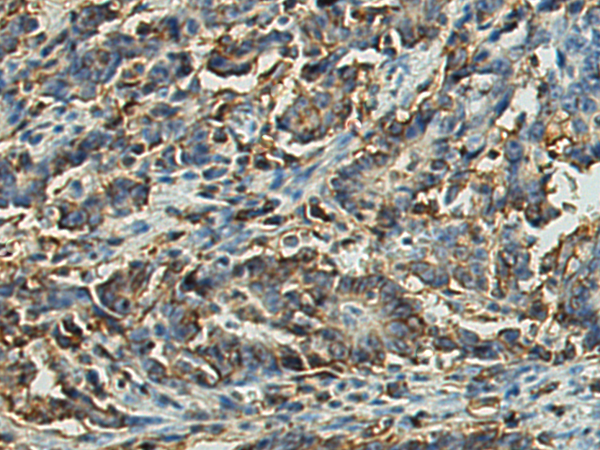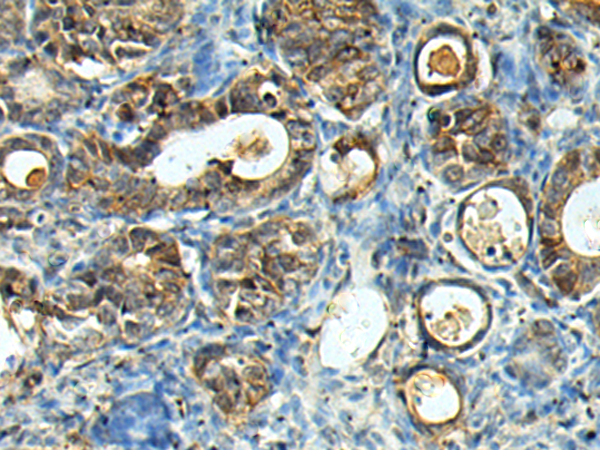

| WB | 咨询技术 | Human,Mouse,Rat |
| IF | 咨询技术 | Human,Mouse,Rat |
| IHC | 1/50-1/100 | Human,Mouse,Rat |
| ICC | 技术咨询 | Human,Mouse,Rat |
| FCM | 咨询技术 | Human,Mouse,Rat |
| Elisa | 1/5000-1/10000 | Human,Mouse,Rat |
| Aliases | IN; LHR; MC56; MDU2; MDU3; MIC4; Pgp1; CDW44; CSPG8; HCELL; HUTCH-I; ECMR-III |
| Host/Isotype | Rabbit IgG |
| Antibody Type | Primary antibody |
| Storage | Store at 4°C short term. Aliquot and store at -20°C long term. Avoid freeze/thaw cycles. |
| Species Reactivity | Human, Mouse, Rat |
| Immunogen | Synthetic peptide of human CD44 |
| Formulation | Purified antibody in PBS with 0.05% sodium azide and 50% glycerol. |
+ +
以下是3-4篇关于CD44抗体的参考文献及简要摘要:
1. **文献名称**:*CD44 antibody-targeted liposomal nanoparticles for molecular imaging and therapy of activated platelets*
**作者**:Luo, D. 等
**摘要**:该研究开发了一种靶向CD44的抗体偶联脂质体纳米颗粒,用于活化的血小板成像和药物递送。实验表明,CD44抗体可增强纳米颗粒在血栓部位的靶向性,并有效抑制血小板聚集。
2. **文献名称**:*Targeting CD44-expressing tumor cells with anti-CD44 monoclonal antibody improves chemotherapeutic efficacy in human acute myeloid leukemia*
**作者**:Jin, L. 等
**摘要**:通过抗CD44单克隆抗体靶向白血病干细胞,研究证明其可增强化疗药物阿糖胞苷的疗效,显著抑制小鼠模型中急性髓系白血病的进展,并降低肿瘤干细胞活性。
3. **文献名称**:*CD44v6-specific antibody fragments for theranostic applications in colon cancer*
**作者**:Heider, K.H. 等
**摘要**:研究针对CD44剪接变体v6的抗体片段,证实其在结直肠癌诊断(PET成像)和治疗(抗体药物偶联物)中的双重潜力,可特异性识别肿瘤细胞并抑制转移。
4. **文献名称**:*Anti-CD44 antibody treatment drives differentiation of tumor-supportive stromal cells and enhances antitumor immunity*
**作者**:Zöller, M. 等
**摘要**:抗CD44抗体通过调控肿瘤微环境中的基质细胞分化,抑制促癌因子分泌,并激活T细胞免疫应答,显著抑制小鼠黑色素瘤和乳腺癌模型的肿瘤生长。
以上文献涵盖CD44抗体在靶向治疗、药物递送、免疫调控及诊断中的应用,均通过实验验证其作用机制及疗效。
CD44 is a transmembrane glycoprotein widely expressed in various cell types, including immune cells, stem cells, and epithelial cells. It functions as a receptor for hyaluronic acid (HA) and participates in cell-cell adhesion, migration, signaling, and interactions with the extracellular matrix. CD44 exists as multiple isoforms generated by alternative splicing, with the standard isoform (CD44s) and variant isoforms (CD44v) exhibiting distinct roles in physiological and pathological processes. CD44 is implicated in inflammation, wound healing, and lymphocyte homing, but its dysregulation is closely linked to cancer progression, metastasis, and therapy resistance.
CD44 antibodies are essential tools for studying its expression, structure, and function. Monoclonal antibodies targeting specific CD44 epitopes or isoforms are used in flow cytometry, immunohistochemistry, and functional blocking assays. In cancer research, CD44 antibodies help identify cancer stem cells (CSCs), a subpopulation associated with tumor initiation and relapse. Certain anti-CD44 antibodies have shown therapeutic potential by disrupting HA-CD44 interactions, inhibiting pro-survival signaling pathways (e.g., PI3K/Akt), or delivering cytotoxic agents directly to CD44-expressing cells.
Despite challenges in isoform specificity and off-target effects, CD44 antibodies remain critical for exploring its role in tumor microenvironments, epithelial-mesenchymal transition (EMT), and immune modulation. They also hold promise as diagnostic markers or targeted therapy components in malignancies overexpressing CD44. such as breast, colon, and pancreatic cancers.
×